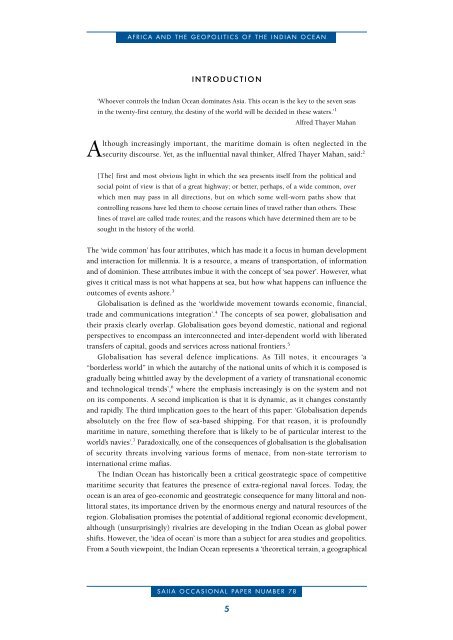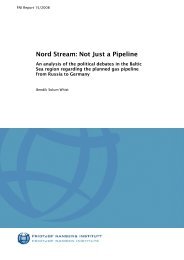Africa and the Geopolitics of the Indian Ocean
Africa and the Geopolitics of the Indian Ocean
Africa and the Geopolitics of the Indian Ocean
You also want an ePaper? Increase the reach of your titles
YUMPU automatically turns print PDFs into web optimized ePapers that Google loves.
AfRICA ANd thE gEOPOLItICS Of thE INdIAN OCEAN<br />
INtRoduCtIoN<br />
‘Whoever controls <strong>the</strong> <strong>Indian</strong> <strong>Ocean</strong> dominates Asia. This ocean is <strong>the</strong> key to <strong>the</strong> seven seas<br />
in <strong>the</strong> twenty-first century, <strong>the</strong> destiny <strong>of</strong> <strong>the</strong> world will be decided in <strong>the</strong>se waters.’ 1<br />
SAIIA OCCASIONAL PAPER NUMBER 78<br />
5<br />
Alfred Thayer Mahan<br />
Although increasingly important, <strong>the</strong> maritime domain is <strong>of</strong>ten neglected in <strong>the</strong><br />
security discourse. Yet, as <strong>the</strong> influential naval thinker, Alfred Thayer Mahan, said: 2<br />
[The] first <strong>and</strong> most obvious light in which <strong>the</strong> sea presents itself from <strong>the</strong> political <strong>and</strong><br />
social point <strong>of</strong> view is that <strong>of</strong> a great highway; or better, perhaps, <strong>of</strong> a wide common, over<br />
which men may pass in all directions, but on which some well-worn paths show that<br />
controlling reasons have led <strong>the</strong>m to choose certain lines <strong>of</strong> travel ra<strong>the</strong>r than o<strong>the</strong>rs. These<br />
lines <strong>of</strong> travel are called trade routes; <strong>and</strong> <strong>the</strong> reasons which have determined <strong>the</strong>m are to be<br />
sought in <strong>the</strong> history <strong>of</strong> <strong>the</strong> world.<br />
The ‘wide common’ has four attributes, which has made it a focus in human development<br />
<strong>and</strong> interaction for millennia. It is a resource, a means <strong>of</strong> transportation, <strong>of</strong> information<br />
<strong>and</strong> <strong>of</strong> dominion. These attributes imbue it with <strong>the</strong> concept <strong>of</strong> ‘sea power’. However, what<br />
gives it critical mass is not what happens at sea, but how what happens can influence <strong>the</strong><br />
outcomes <strong>of</strong> events ashore. 3<br />
Globalisation is defined as <strong>the</strong> ‘worldwide movement towards economic, financial,<br />
trade <strong>and</strong> communications integration’. 4 The concepts <strong>of</strong> sea power, globalisation <strong>and</strong><br />
<strong>the</strong>ir praxis clearly overlap. Globalisation goes beyond domestic, national <strong>and</strong> regional<br />
perspectives to encompass an interconnected <strong>and</strong> inter-dependent world with liberated<br />
transfers <strong>of</strong> capital, goods <strong>and</strong> services across national frontiers. 5<br />
Globalisation has several defence implications. As Till notes, it encourages ‘a<br />
“borderless world” in which <strong>the</strong> autarchy <strong>of</strong> <strong>the</strong> national units <strong>of</strong> which it is composed is<br />
gradually being whittled away by <strong>the</strong> development <strong>of</strong> a variety <strong>of</strong> transnational economic<br />
<strong>and</strong> technological trends’, 6 where <strong>the</strong> emphasis increasingly is on <strong>the</strong> system <strong>and</strong> not<br />
on its components. A second implication is that it is dynamic, as it changes constantly<br />
<strong>and</strong> rapidly. The third implication goes to <strong>the</strong> heart <strong>of</strong> this paper: ‘Globalisation depends<br />
absolutely on <strong>the</strong> free flow <strong>of</strong> sea-based shipping. For that reason, it is pr<strong>of</strong>oundly<br />
maritime in nature, something <strong>the</strong>refore that is likely to be <strong>of</strong> particular interest to <strong>the</strong><br />
world’s navies’. 7 Paradoxically, one <strong>of</strong> <strong>the</strong> consequences <strong>of</strong> globalisation is <strong>the</strong> globalisation<br />
<strong>of</strong> security threats involving various forms <strong>of</strong> menace, from non-state terrorism to<br />
international crime mafias.<br />
The <strong>Indian</strong> <strong>Ocean</strong> has historically been a critical geostrategic space <strong>of</strong> competitive<br />
maritime security that features <strong>the</strong> presence <strong>of</strong> extra-regional naval forces. Today, <strong>the</strong><br />
ocean is an area <strong>of</strong> geo-economic <strong>and</strong> geostrategic consequence for many littoral <strong>and</strong> nonlittoral<br />
states, its importance driven by <strong>the</strong> enormous energy <strong>and</strong> natural resources <strong>of</strong> <strong>the</strong><br />
region. Globalisation promises <strong>the</strong> potential <strong>of</strong> additional regional economic development,<br />
although (unsurprisingly) rivalries are developing in <strong>the</strong> <strong>Indian</strong> <strong>Ocean</strong> as global power<br />
shifts. However, <strong>the</strong> ‘idea <strong>of</strong> ocean’ is more than a subject for area studies <strong>and</strong> geopolitics.<br />
From a South viewpoint, <strong>the</strong> <strong>Indian</strong> <strong>Ocean</strong> represents a ‘<strong>the</strong>oretical terrain, a geographical













